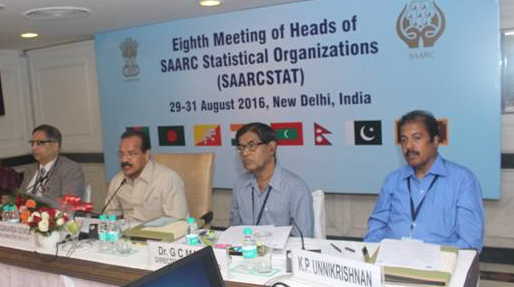India hosted the three-day(August 29-31,2016) Eighth meeting of SAARCSTAT and delegates from SAARC Member States and other international organizations viz., FAO, PARIS 21, and ADB attended the Meet.
The theme of this Meeting is “Trade Statistics – Merchandise & Services”.
Venue: New Delhi
About SAARCSTAT :
The South Asian region is richly endowed in terms of human resources and has to its credit several internationally renowned statisticians. P.C. Mahalanobis, the founder of Indian Statistical Institute was one of them who visualized, in early 40’s, Statistics as the “Key Technology of the era”.
- Over decades, Statistics has been used as the technology on how to measure various social and economic indicators in order to understand our Society better. This will be clear from PARIS21 document which quoted “IF YOU CANNOT MEASURE YOU CANNOT MANAGE”.
- It is now imperative that the Statistics has to play an important role for closer cooperation within the SAARC region be it analysis of Intra-regional Trade Statistics according to common denomination and standardized Trade Classification or various socio-economic statistical parameters including poverty profile of the region.
- Thus, for justified reason, the proposal for establishing cooperation in Statistics received enthusiastic support of the SAARC Member States which got the approval at the Thirtieth Session of the Standing Committee of SAARC (Islamabad, 18-19 July 2004).
- The Twelfth Meeting of the Committee on Economic Cooperation (Islamabad, 20-21 November 2004) welcomed the offer of India to host the First Meeting of the Heads of Statistical Organizations of SAARC Member States to examine the possibility of initiating cooperation in the field of statistics with a view to finalizing standard formats for exchange of statistical data in various economic and social fields.
- Accordingly, in order to pursue and concretize cooperation in the field of statistics, the Heads of SAARC Statistical Organisations in their Meeting at Kolkata, India on 26-27 May 2005 formed a permanent “SAARC Group on Statistics”, namely, SAARCSTAT; SAARCSTAT is now a reality and this could be termed as milestone development for this region.
- In the First meeting of SAARCSTAT at Kolkata, following Technical Subgroups were formed and the four countries offered to work as coordinators of Technical Subgroups:
| S. No. | Technical Sub-Group on | Coordinator |
| 1. | SAARC Statistical Yearbook | Bangladesh |
| 2. | Informal Sector | India |
| 3. | Capacity Building | India |
| 4. | SAARCSTAT Action Plan | India |
| 5. | SAARCSTAT Website | Pakistan |
| 6. | Classification | Pakistan |
| 7. | SNA93 | Sri Lanka |
8th Meet :
i.The Statistics Ministry in India attaches considerable importance to coverage and quality aspects of statistics released in the country and are constantly working to achieve international standards.
ii.This was stated by the Minister for Statistics and Programme Implementation, Shri. D.V. Sadananda Gowda, while inaugurating the 8th Meeting of Heads of SAARC Statistical Organizations (SAARCSTAT).
iii.He also stated that Accurate, reliable and timely information plays an important role for effective decision making in almost every aspect of human endeavor. It is an essential ingredient for decisions makers and Policy planners.
iv.Reducing Asymmetry in Trade data amongst SAARC countries is one of the topics for discussion in this Meeting. Reducing asymmetry in bilateral trade data is an issue which requires serious attention from the data compilers.
v.Although India has taken up the issues of data reconciliation with a few countries like China, Brazil, Vietnam, Philippines, South Korea, Japan, South Africa, Sri Lanka but much more needs to be done to bring down the asymmetry to an acceptable level especially in the SAARC Region.
It is essential to put into
- Operation simplified and transparent rules of origin;
- Implementation of trade facilitation measures;
- Harmonization of standards relating to Technical Barriers to Trade (TBT) and
- Sanitary and phyto-sanitary measures;
- Harmonized, streamlined and simplified Custom procedures;
- Elimination of non-tariff and para-tariff barriers;
It is noted that the policy initiatives for comparable statistics and smooth & efficient transit and transport facilities, which will provide an opportunity to the SAARC Members countries to review the implementation of the recommendations made in International Merchandise Trade Statistics (IMTS) 2010 and Manual on Statistics of International Trade in Services (MSITS) 2010.





